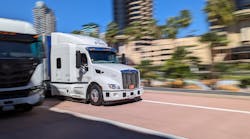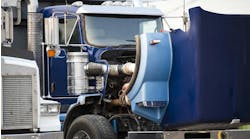I always love to be at events where I can interact with people across the industry. During American Trucking Associations' Management Conference & Exhibition last week, there was a lot of spirited debate about the pros and cons of battery-electric vehicles against the backdrop of how we move goods today with traditional internal combustion-engine diesels.
The big takeaway from the presentations I sat in on and the conversations I had with event attendees is that we need to keep having these conversations. But more importantly, we need to make sure we are deeply educated on the facts of the technology options available and in which duty cycles they will work—and in which they won’t. This is not a time for speculation or misinformation.
See also: New technology doesn't have to be scary
Making the right technology choice for the short, medium, and long term is critical. And those decisions may change over time as we navigate through the next several decades when we likely will see significant improvements in some of the emerging technologies as well as changes to diesel-powered vehicles because of upcoming emission regulations.
My advice to fleets is, when possible, to seek out unbiased sources of information about these emerging technologies and how they might fit into your operations. Or at least understand the bias of the person with whom you are speaking. No technology is perfect; each has its benefits and challenges. You don’t have to reject a technology solution simply because of its associated challenges as long as the benefits outweigh the challenges and you get the ROI you are looking for.
There are many things to consider other than simply the return on investment. How does this technology fit with the demands of your customers to be more sustainable? Does the technology have lower cost potential with scaling? Are other fleets in my market segment making decisions to pursue these alternatives?
The next few years are going to be filled with opportunities for fleets to have conversations about a variety of new technologies that will lead to a greener transportation future. To get the most out of those conversations and to make smart decisions, make sure you have armed yourself with the facts from reliable sources so that you are basing your decision on the realities of the technology and not on the hype surrounding it.
Michael Roeth has worked in the commercial vehicle industry for nearly 30 years, most recently as executive director of the North American Council for Freight Efficiency (NACFE). He serves on the second National Academy of Sciences Committee on Technologies and Approaches for Reducing the Fuel Consumption of Medium and Heavy-Duty Vehicles and has held various positions in engineering, quality, sales, and plant management with Navistar and Behr/Cummins.



